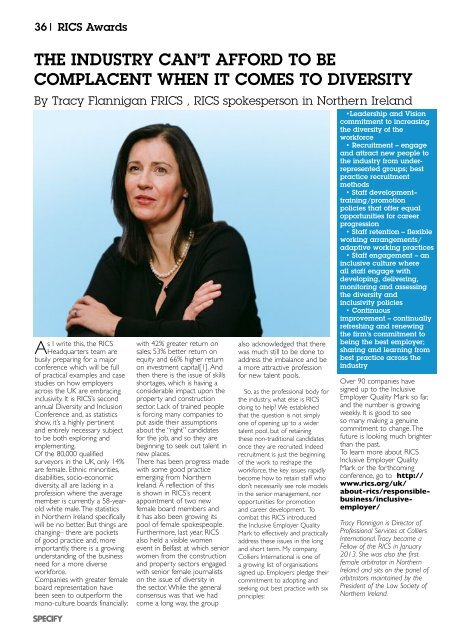Create successful ePaper yourself
Turn your PDF publications into a flip-book with our unique Google optimized e-Paper software.
36| RICS Awards<br />
THE INDUSTRY CAN’T AFFORD TO BE<br />
COMPLACENT WHEN IT COMES TO DIVERSITY<br />
By Tracy Flannigan FRICS , RICS spokesperson in Northern Ireland<br />
As I write this, the RICS<br />
Headquarters team are<br />
busily preparing for a major<br />
conference which will be full<br />
of practical examples and case<br />
studies on how employers<br />
across the UK are embracing<br />
inclusivity. It is RICS’s second<br />
annual Diversity and Inclusion<br />
Conference and, as statistics<br />
show, it’s a highly pertinent<br />
and entirely necessary subject<br />
to be both exploring and<br />
implementing.<br />
Of the 80,000 qualified<br />
surveyors in the UK, only 14%<br />
are female. Ethnic minorities,<br />
disabilities, socio-economic<br />
diversity, all are lacking in a<br />
profession where the average<br />
member is currently a 58-yearold<br />
white male. The statistics<br />
in Northern Ireland specifically<br />
will be no better. But things are<br />
changing– there are pockets<br />
of good practice and, more<br />
importantly, there is a growing<br />
understanding of the business<br />
need for a more diverse<br />
workforce.<br />
Companies with greater female<br />
board representation have<br />
been seen to outperform the<br />
mono-culture boards financially:<br />
with 42% greater return on<br />
sales; 53% better return on<br />
equity and 66% higher return<br />
on investment capital[1]. And<br />
then there is the issue of skills<br />
shortages, which is having a<br />
considerable impact upon the<br />
property and construction<br />
sector. Lack of trained people<br />
is forcing many companies to<br />
put aside their assumptions<br />
about the “right” candidates<br />
for the job, and so they are<br />
beginning to seek out talent in<br />
new places.<br />
There has been progress made<br />
with some good practice<br />
emerging from Northern<br />
Ireland. A reflection of this<br />
is shown in RICS’s recent<br />
appointment of two new<br />
female board members and<br />
it has also been growing its<br />
pool of female spokespeople.<br />
Furthermore, last year, RICS<br />
also held a visible women<br />
event in Belfast at which senior<br />
women from the construction<br />
and property sectors engaged<br />
with senior female journalists<br />
on the issue of diversity in<br />
the sector. While the general<br />
consensus was that we had<br />
come a long way, the group<br />
also acknowledged that there<br />
was much still to be done to<br />
address the imbalance and be<br />
a more attractive profession<br />
for new talent pools.<br />
So, as the professional body for<br />
the industry, what else is RICS<br />
doing to help? We established<br />
that the question is not simply<br />
one of opening up to a wider<br />
talent pool, but of retaining<br />
these non-traditional candidates<br />
once they are recruited. Indeed<br />
recruitment is just the beginning<br />
of the work to reshape the<br />
workforce, the key issues rapidly<br />
become how to retain staff who<br />
don’t necessarily see role models<br />
in the senior management, nor<br />
opportunities for promotion<br />
and career development. To<br />
combat this RICS introduced<br />
the Inclusive Employer Quality<br />
Mark to effectively and practically<br />
address these issues in the long<br />
and short term. My company,<br />
Colliers International is one of<br />
a growing list of organisations<br />
signed up. Employers pledge their<br />
commitment to adopting and<br />
seeking out best practice with six<br />
principles:<br />
• Leadership and Vision<br />
commitment to increasing<br />
the diversity of the<br />
workforce<br />
• Recruitment – engage<br />
and attract new people to<br />
the industry from underrepresented<br />
groups; best<br />
practice recruitment<br />
methods<br />
• Staff development–<br />
training/promotion<br />
policies that offer equal<br />
opportunities for career<br />
progression<br />
• Staff retention – flexible<br />
working arrangements/<br />
adaptive working practices<br />
• Staff engagement – an<br />
inclusive culture where<br />
all staff engage with<br />
developing, delivering,<br />
monitoring and assessing<br />
the diversity and<br />
inclusivity policies<br />
• Continuous<br />
improvement – continually<br />
refreshing and renewing<br />
the firm’s commitment to<br />
being the best employer;<br />
sharing and learning from<br />
best practice across the<br />
industry<br />
Over 90 companies have<br />
signed up to the Inclusive<br />
Employer Quality Mark so far,<br />
and the number is growing<br />
weekly. It is good to see<br />
so many making a genuine<br />
commitment to change. The<br />
future is looking much brighter<br />
than the past.<br />
To learn more about RICS<br />
Inclusive Employer Quality<br />
Mark or the forthcoming<br />
conference, go to http://<br />
www.rics.org/uk/<br />
about-rics/responsiblebusiness/inclusiveemployer/<br />
Tracy Flannigan is Director of<br />
Professional Services at Colliers<br />
International. Tracy became a<br />
Fellow of the RICS in January<br />
2013. She was also the first<br />
female arbitrator in Northern<br />
Ireland and sits on the panel of<br />
arbitrators maintained by the<br />
President of the Law Society of<br />
Northern Ireland.


